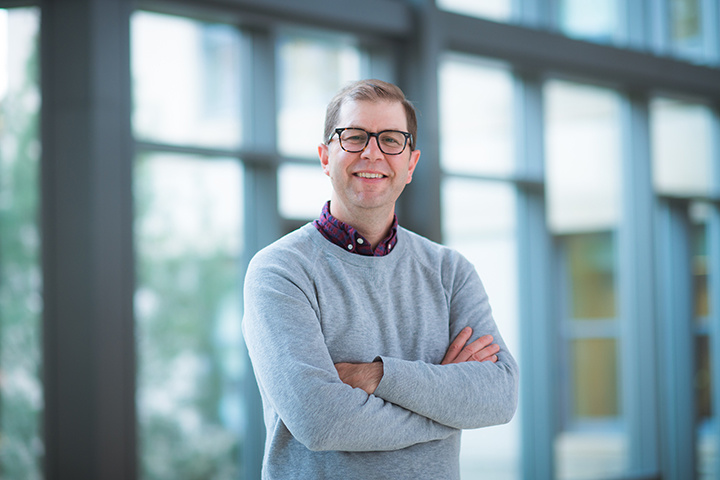Devin Caughey: Straddling the divide between qualitative and quantitative eras of political science

Department of Political Science Instructor Devin Caughey
Photo: Stuart Darsch
Devin Caughey, newly appointed MIT Political Science instructor, has spent much of the last few years working with vintage polling data – information gathered in the 1930s and early 1940s, before pollsters learned to implement rigorous sampling techniques.
After parsing out the long-lost meaning of the various data fields, Caughey and his colleagues (including Professors Adam Berinsky of MIT and Eric Schickler of the University of California at Berkeley) have applied modern statistical analysis to extract new insights, including a groundbreaking assessment of how the influential Southern congressional representatives of the time reflected and reacted to the evolving feelings of their constituents.
This ability to see and interpret formative political events through a previously unavailable lens represents a fusion of methodologies that goes to the heart of Caughey’s work.
“There’s a divide that I try to straddle,” explains Caughey. “The quantitative era began about 1952, when rigorous public opinion polls began to be conducted. For the time prior to that, because we don’t have the data, people work with very different methodologies. But it’s not like the politics of the US radically changed at that point – just our methods of analysis.”
The goal (which reflects Course 17’s emphasis on innovative analytical techniques) is to bring contemporary quantitative tools to bear on eras that are traditionally considered qualitatively, without losing the value of qualitative analysis. “The discipline as a whole has grappled with this for a generation…if we can, as a department, learn to respect both approaches and bring them together, that’s great. And as individuals it’s even better,” notes Caughey.
A good example is a 2011 paper co-written with Schickler, “Public Opinion, Organized Labor, and the Limits of New Deal Liberalism, 1936–1945.” It documents a broad national opinion shift against organized labor, and contrasts support for specific New Deal programs with a lack of enthusiasm for major expansion of the federal government’s role. The findings “illuminate the role played by the South in constraining New Deal liberalism while also highlighting the tenuousness of the liberal majority in the North.”
Caughey, who did his doctoral work at Berkeley after receiving a BA at Yale University and an M. Phil. at Clare College, Cambridge University, has begun his MIT teaching with class 17.263/264, “U.S. National Elections.” It’s an auspicious moment, with the Obama-Romney presidential election in full swing, and Massachusetts seeing a rare competitive Senate race between incumbent Scott Brown and Elizabeth Warren.
Says Caughey, “one of the great things about teaching undergraduates is that they’re almost always experiencing their first election, opening up to the political world for the first time and making their initial judgments about politics and what they think. That’s going to stick with them.” He adds, “it’s so impressive how smart the MIT students are. They’re incredibly bright and motivated, especially since for the most part they don't have to take the class.”
The curriculum focuses less on tracking of current races than on giving students “a historical and theoretical lens, a broader perspective on this election and a sense of how it fits into broader historical patterns and how much things have changed,” explains Caughey. He points to a set of electoral maps on his office wall, noting that as recently as 1992, Democrats won a majority of Southern congressional seats, in contrast to today’s Republican domination.
Looking ahead, Caughey and Berinsky will be continuing their research on early polling data; new National Science Foundation funding will enable the work to extend up to the 1952 election. Caughey is also eager to collaborate with fellow first-year Americanist Assistant Professor Chris Warshaw, as both are interested in statistical methods that allow use of national polls to gain insights into sub-national regions.
Caughey lives in Cambridge with his wife, Sara, who studies Chinese politics and teaches at Harvard; he is an avid singer, and will perform this season as a tenor with the Oriana Consort.